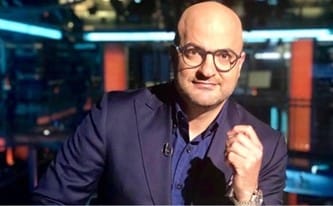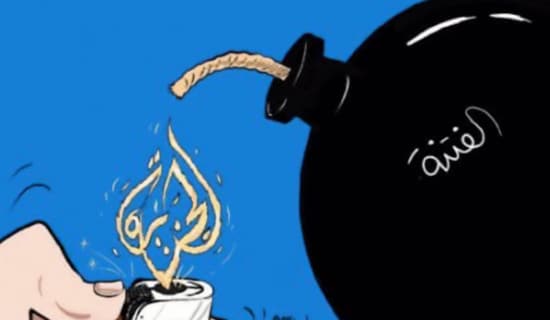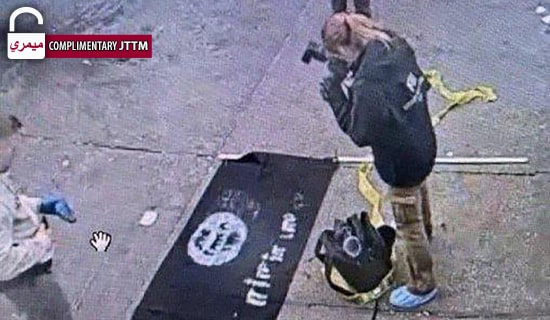In a June 4, 2024 article in the London-based Saudi daily Al-Sharq Al-Awsat, Shi'ite Lebanese journalist and media figure Nadim Koteich writes that the student protests against the Gaza war in U.S. campuses ultimately serve extremist Islamist elements like Iran, Al-Qaeda and the organizations of political Islam. These elements, he explains, exploit the ideology of the liberal left to weaken the West and promote their own ideology that rejects pluralism, equality and human rights. He adds that, by presenting Israel as a temporary and illegitimate product of Western imperialism and even denying its right to exist, the liberal left adopts the narrative of these extremist Islamists and inadvertently serves their goals.

Nadim Koteich (Image: Arabi21.com)
The following are translated excerpts from his article:[1]
"Iran's praise for the protests against the Gaza war held by students in U.S. campuses converged with the position of the Al-Qaeda organization [on these protests]. Iran's Supreme Leader praised what he called the steadfastness of the protesting [students], and said that they are 'on the right side of history' and 'have managed to open another resistance front against Israel.' A statement issued by Al-Qaeda's top leadership said, [in a similar vein], that 'we appreciate and esteem the protest movement of the students at the Western universities who are staging demonstrations and sit-ins to express their opposition to the genocide taking place in dear Gaza.'
"This puzzling convergence [of positions] between the liberal left and extremist Islam goes beyond geopolitical agreement and has grave ideological, psychological and strategic dimensions.
"True, the protest movement of left-wing students that supports the Palestinian cause usually focuses on human rights and social justice. Yet the finer details [of its position], which have to do with its radical opposition to Israel as a temporary product of illegal imperialism, fully conform to the perception of extremist Islamists like Al-Qaeda and the Iranian regime. The slogan 'Palestine will be free from the river to the sea,' which does not leave any room on the map for Israel, is a terrifying point of convergence between these students who are rising up in the Western universities and the narrative of the most extremist Islamists who pledge to exterminate Isael out of religious and ideological motivations, chief of them [the desire to] weaken the influence of the West and strengthen the model of political Islam. In this manner, the students at Western universities have become one of the elements that weaken the West itself – the Western [world] where they live and whose freedoms and universities they enjoy – and have become tools which the extremists use to defend their own extremism under the slogan of cultural and religious independence.
"The naivete of the liberal left contrasts with the exploitation of the student protests by the extremist organizations, which use [these protests] as a strategic opportunity to legitimize their own causes, broaden their support base and transform it into a platform for recruiting [more] supporters and operatives. Perhaps what blinds the liberal left is the convergence [of opinions] with the radical Islamists, and the assumption that they enjoy the moral high ground in their struggle with their joint enemies. [This assumption] disregards the fact that the ultimate social and political goal of the two sides is completely different. While the liberal left believes that it is promoting justice, equality and cultural pluralism, the extremist [Islamists] seek to establish closed and oppressive societies under the guise of holy war against corruption and moral degeneracy. The liberals' staunch defense of [the practice of wearing] the hijab may be the pinnacle of this surrealist farce. Because, while the liberals defend the hijab as an emblem of tolerance, pluralism and opposition to cultural imperialism, the leaders of political Islam use the hijab in their game of identity [politics] and of oppressing, controlling and subjugating women!
"Despite this, it seems that the ideological bond between the two camps is much stronger than the obvious differences in the goals and principles that each ultimately seeks to realize. Both sides espouse the idea of profound change and of toppling the existing frameworks of power. They also share the belief that revolutionary action – by social movements or through political upheaval or armed struggle – is the way to realize their goals and attain a just society.
"Since the narratives of both camps focus on opposing oppression and fighting for justice, and since both feel they are excluded from the existing global power frameworks, there is solid ground for agreement between them, with each side using the other's narrative to justify its actions and strategy.
"If we look back a bit, we will find that Iran made strategic use of the literature and ideologies of the left to realize its revolutionary goals. It combined elements of anti-colonial discourse with Marxist-Leninist perceptions of socioeconomic justice and support for the poor and the oppressed in order to arouse revolutionary sentiment. This was a key part of the efforts made by Iran [i.e., by Khomeini's supporters] to form strategic coalitions with left-leaning groups and academics, and to use the ideas of Ali Shariati[2] to unite the opposition to the Shah regime.
"The criticism of the liberal left against the economic and social ramifications of Western capitalism converged with the criticism voiced by political Islam against what it saw as the West's moral degeneration that stems from [capitalism] and against [the West's] use of [capitalism] as part of a policy of fanning international identity struggles. The criticism of the liberal left against the militarizing of democracy converged with the criticism voiced by political Islam against all relations with the West, which is presented as a Crusader power that controls the Muslims' physical and cultural resources and benefits from 'the weakness of the pro-Western [Muslim] regimes'!
"The contemporary example is the linguist and political activist Noam Chomsky, whose take on Al-Qaeda's September 11, 2001 attacks in New York and Washington converged horrifically with Osama Bin Laden's own excuses. Chomsky believes that these attacks resulted from decades of American military policy in the Middle East and elsewhere, which bred a great deal of resentment and violent reactions. Chomsky's criticism of America's foreign policy indirectly benefits Bin Laden's narrative, which sees the U.S. as the enemy of the Muslim world. At the same time, Bin Laden's violence and extremism supports Chomsky's claim that America's policy increases hostility and terror."
[1] Al-Sharq Al-Awsat (London), June 4, 2024.
[2] Ali Shariati Mazinani (1933-1977), an Iranian revolutionary and sociologist who focused on the sociology of religion, was called "the ideologue of the Iranian Revolution," but his ideas did not ultimately form the basis of the Islamic Revolution regime.




